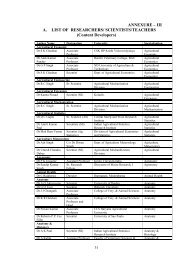You also want an ePaper? Increase the reach of your titles
YUMPU automatically turns print PDFs into web optimized ePapers that Google loves.
seem to have most significance in sheep feeding are Vitamins A and D. The symptoms of<br />
vitamin deficiencies are anorexia, reduced growth, dermatitis, weakness and staggering gait. In<br />
sheep vitamin A is more important and its deficiency can cause various kinds of blindness.<br />
Vltamin deficiency also leads to abnormal bone development, weak and still-born lambs and<br />
respiratory problems.<br />
Vitamin A<br />
This vitamin is synthesized by animals from the carotene of plants. Carotene is abundant in<br />
the green parts of plants and is also plentiful in the yellow coloring matter of corn carrots and<br />
sweet potatoes. Its importance explains why sheepmen had long insisted and even insist today<br />
that there were certain things of great nutritive value in such things as carrots clorers in alpine<br />
postures that had not been revealed by the usual analysis pertaining only to nitrogen-free<br />
extract, protein, minerals, and dry matter. Vitamin A promotes growth and aids in protection<br />
against respiratory infections and impaired vision. A deficiency ofthis vitamin in sheep is<br />
characterized by night blindness, sore eyes, poor appetite, poor condition, and weakness.<br />
Affected ewes may be, or their lambs may be very weak and die soon after birth. Although the<br />
carotene of feeds may decrease rapidly during curing and storage, high grade legume hay of<br />
good green color, good silage, and roots, such as carrots, are fair to good sources of vitamin A.<br />
Green pastures, however, are the best natural sources for sheep. It is not unreasonable to<br />
suggest that some ofthe difhculties that develop during the late winter months, especially after<br />
periods of summer drought, may be associated with a deficiency of this vitamin. It is stored in<br />
the liver of sheep, but there may be cases where storage is not ample to meet all the needs of<br />
breeding ewes and their lambs.<br />
Vitamins B<br />
<strong>Sheep</strong> seldom suffer from any lack of B vitamins, for it has been shown that they have the<br />
ability to synthesize practically all of the known vitamins (the B-complex) the rumen. It is<br />
generally thought that all ofthe vitamins thus formed become available to the sheep as the feed<br />
is later digested. The B vitamins furnish a stimulation to the appetite, protect against nervous<br />
disorders, and are essential for reproduction and lactation. There may be cases of deficiencies<br />
in newborn lambs, but none has been thoroughly demonstrated, and it is unlikely that they<br />
occur in older lambs and sheep, since, in addition to the synthesis in the rumen. Yeast is very<br />
high in some of the B vitamins.<br />
Vitamin C<br />
Except in the case of newborn lambs, it is not likely that sheep require a dietary source of<br />
this vitamin due to internal synthesis by microorganisms.<br />
Vitamin D<br />
For sheep the only important sources of vitamin D in feeds are in field-cured hays, as<br />
growing plants and grains have very little or none of the material. When sheep are exposed to<br />
sunshine, vitamin D is formed in the body by the action ofthe ultraviolet rays. Hence, any<br />
deficiency is most likely to be evident late in the winter after periods of cloudiness and when<br />
the sunshine is not so effective. Vitamin D is an essential for the metabolism of calcium and<br />
phosphorus and for the formation of bone. Without adequate vitamin D young animals develop<br />
rickets or a "bent-leg" condition. Vitamin D cannot make up for a lack of calcium and<br />
phosphorus, but these minerals cannot be effectively used in the absence ofthis vitamin. Some<br />
spasms and sudden death in winter lambs of few weeks of age have been associated with<br />
inadequate vitamin D.<br />
Vitamin E<br />
In some animals normal reproduction is impossible without vitamin E, but there are few<br />
reports regarding its need by sheep. "Stiff lamb" or white mub,te disease in newborn lambs<br />
results from vitamin E deficiency. <strong>Sheep</strong> can eat many types of fodders, grains and cakes. It can<br />
also eat some types of shrubs and leaves of variety of tree species. <strong>Sheep</strong> is also able to meet all<br />
its requirements of nutrients from grass lands except during winter season. Since most feeds,<br />
426




